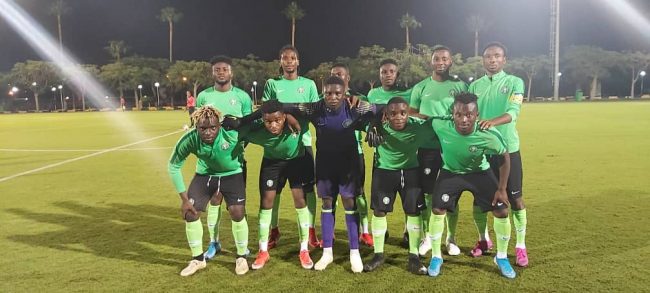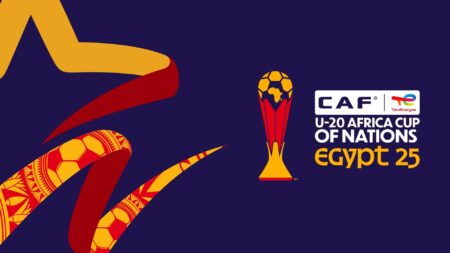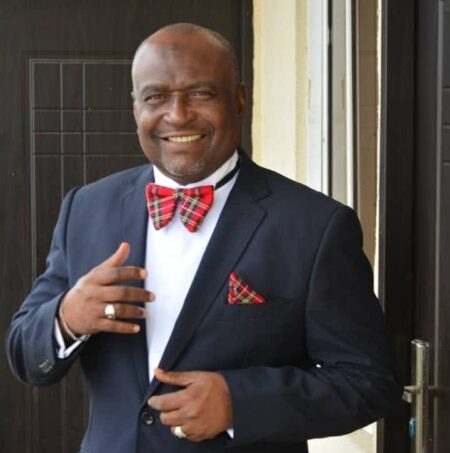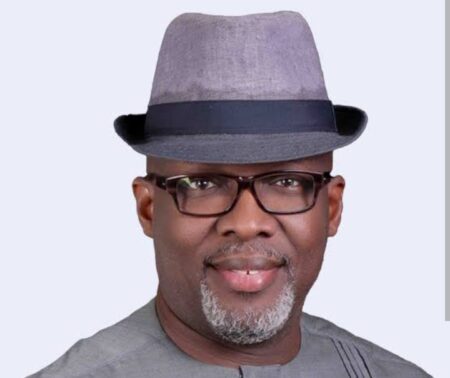Listen to the article
The Nigeria Football Federation has hailed the decision of the Honourable Minister of Youth and Sports Development, Sunday Dare to request for a report on the performances of the various national football teams in recent weeks, and football governing body has duly complied on Monday.
“It was a good move by the Honourable Minister to request for the report. As he said, there has to be stock taking and after that, accountability. The NFF is enamoured by the move, and we have submitted the requested report,” President of NFF, Mr. Amaju Melvin Pinnick, said on Tuesday.
“For us, there is nothing to hide. We have detailed all the issues and the forces at play, and explained that in so much as these tournaments are important, they are mainly and strategically developmental.
“Even at that, we approach every match/tournament with the intention of winning, but it is practically and absolutely impossible based on indices, records and scientific laws of probability.”
In a 15 –page letter signed by Pinnick, the NFF detailed issues of funding (inadequacy and late release of same) and the toxic and disruptive environment in which it has had to operate for the past 18 months (with the Federation’s leadership and brand falsely and maliciously dragged from one investigative agency to the other and from one court to the other on same baseless allegations) as core reasons for the poor outings of the Super Falcons, CHAN Eagles, Golden Eaglets and Olympic Eagles in recent international matches/tournaments.
While acknowledging the importance of the qualifying matches/tournaments in which these teams participated and fell short, the Federation defended the technical crews of the teams and justified why they are the best for the positions as at the time they were hired by highlighting their track records.
Pinnick also stated that the best performance indicator for any country in international football is the A team, in this case Super Eagles, which in recent times drew with five –time world champions Brazil and Ukraine in friendlies, and defeated Benin Republic and Lesotho in 2021 AFCON qualifying matches. These, after finishing third at the first –ever 24 –team AFCON in Egypt this year summer. Moreover, a high number of the players in the present Super Eagles squad passed through the various developmental teams, showing that Nigeria is moving in the right direction.
The NFF went ahead to map out strategies for better results going forward, including but not limited to a revamp of the NFF Technical Department; improved supervision of the teams by the NFF Technical Committee; open and transparent process to select new head coaches for the teams affected; early preparation and prioritization of tournaments; synergy between the Ministry and the NFF to get approved funds released early enough for adequate preparation of teams participating in major matches and competitions and; to work even harder at securing partners and sponsors to support the programmes of the National Teams.
On the issue of the nominal roll, which has also been submitted, the NFF clarified that there is no person on its payroll whose contract has expired, and that every individual on the nominal roll has specified schedule of duty as prescribed by the Federal Civil Service or in line with his/her contract.








6 Comments
Pinnick Amadu is good for Nff post he think third place is good for Nigeria he should go back his Delta state this is Nigeria football we talking about the currents boys playing in the super eagles now are all hand work of Samson Siasia three years ago Olympic and Ammunike gold winning under 17 boys, that’s why nigeria have what is called super eagles today, anytime Nigeria failed at the cadets level theirs always problem to assemble senior national teams 2019 under 17 world cup was won by brazil that means and Mexico came second this two countries came with talented young lads to the competition that means the future of their national teams are bright and also Holland. Amadu open your eyes is not about talking since you’ve been in that post Nigeria has won less .
And why is Manu Garba still the coach of under 17? Why?
Pls enough of this name calling. I believe that we have the best results and active response to tournaments especially under Amaju Pinnicks tenure. Football administration is not Mathematics but developmental and can be altered once we start allowing uneccessary distractions. Allow him to concentrate and finish the good works he has started.
And why is Alloy Agu, Imama still handling our national teams..
Oliseh, Finidi, Rufai, Emenalo, Garba Lawal, Amokachi, Mutiu Adepoju and Amuneke should be considered for our next national teams set up.
Vote Ibrahim Said’s goal for FIFA U17 WC GOTT https://www.fifa.com/u17worldcup/videos/goal-of-the-tournament/#
The curtains were drawn on the 18th edition of the FIFA U-17 World Cup, Brazil 2019 over the weekend.
But the performance of five-time champions, the Golden Eaglets of Nigeria still leaves a sour taste in the buds of their teeming fans.
Brazil secured its 4th U-17 title, to place second behind Nigeria who have five on the overall FIFA U-17 winners medal table.
The Manu Garba led team was unceremoniously sent packing in the second round and Nigerians could not hide their displeasure.
With Brazil needing just one win to equal the most priced bragging right Nigerians hold in world football, coupled with the early ouster of the Golden Eaglets in Goiânia, Brazil, is it time to raise a red flag for the Eaglets?
Nigerians could not hid their displeasues over the performances of the team as they poured out venoms on Twitter.
@HeartofStJohn1 : ”No Nation’s cup for home based Eagles, Super Falcons failed to qualify for the Olympics, U17 failed.. now they will say they want to go back to the drawing board.. instead of always going back to the drawing board, I suggest you stay permanently at the drawing board.”
@99thbishop : ”What’s happened here is that we fielded the youngest set of u17s ever, and it became very glaring how much technical essence the nation’s football lacks.”
@I_am_Ifedayo : @thenff Discouraging these guys will not help our football grow. To face the fact, this is one of the youngest U-17 team the country has ever produced. It’s time we started encouraging the real U-17s over the U-40s that we thought were the best. That’s why they disappear with no time.”
@Okey2blac “I strongly disagree, these guys can go ahead and have successful careers in football. Uzoho who was a ‘bench wormer’ at #U17WC is a mainstay in the @NGSuperEagles today while Iheanacho who shone like a million stars in same #U17WC is currently struggling to make the team.”
It is worthy of note that though Nigeria is five-time winners and three times runners up at the U-17 world cup, this has not directly translated to success for the senior national team, the Super Eagles.
Despite Nigeria’s enviable records at the youth level, the Super Eagles are yet to go beyond the second round of FIFA Senior World Cup.
Nigeria have consistently churned out super stars at youth football level, but consistently shown the world it lacked the know-how to make them achieve at the senior level.
What happened with Stanley Okoro (little Messi), Rabiu Ibrahim (the next Jay-Jay Okocha), Philip Osondu (Best Player Canada 87), Macauley Chrisantus (Golden Boot winner Korea 2007), Sani Emmanuel (Best Player Nigeria 2009), Femi Opabunmi( Silver Shoe winner Trinidad and Tobago 2001).
They all have one thing in common, celebrated junior players who never made their marks at the senior level.
The question is why has it been difficult to translate success at the junior level to winner’s medals at the senior level?
This should be the focus of genuine football lovers. That the Eaglets won or lost should be of little importance compared to what became of them after the world cup.
”Experience is the most important thing in life. Whether you play in a final as a teenager, at school or the highest level, you must be able to take the essence of tomorrow’s success from these unique moments,” said Johan Cruyff.
Win or lose, conscious efforts must be made by the NFF to graduate the players to the next level (U20) and finding a core that can be nurtured for bigger and better things with the senior national team.
Such concept above is easier said than done as can be seen in the numbers of high-profile U17 players who failed to make their mark at the senior levels.
According to http://www.ftbl.com, only two members of the Mexican team that won in 2011 have gone on to play for Mexico’s senior national side eight years later, Alfonso González and Marco Bueno.
Another good reminder is Nii Odartey Lamptey, once described by ESPN.com as perhaps the most high-profile African wonderkind who never realized the potential he demonstrated at the youth level.
Brazil’s 2005 U17 world cup wonderkind Kerlon Moura Souza also comes to mind. The attacking midfielder scored eight goals in seven matches to lead Brazil to the 2005 South American Under 17 Football Championship title. He was the top scorer and also won the best player award, but later went under the radar.
First, it must be agreed that for most of these players to get a look in from the Super Eagles handlers in the future, they should be playing regularly at least for modest clubs in Europe.
It is well known today that teams that win the FIFA Senior World Cup have majority of its squad members plying their trades in top clubs in Europe.
The organization and standard of football played in Europe is far better than what is unavailable in other continents.
It is also of great importance for the players to consider the style of play, chances of regular playing time, youth development profile and culture similarities when choosing their European destinations.
The NFF also have an advisory role to play. Player’s guardians should be educated on why the long-term future of their kids should be prioritized ahead of the lure to make more money.
The NFF should also keep records of these players, help them get good local clubs for those who might not be lucky to make it to Europe and make sure the players form the core of the next U-20 team.
Another important part of this development is for the Football Federation to continue with its policy of graduating the youth players alongside their coaches to the next level.
This seems to be paying off for Nigeria. John Obuh, who led the U-17s to the final of the world cup in 2009 was promoted to the U-20s. He took the majority of his U-17 boys to the U-20 World Cup and 10 years later at least seven (Ramon Azeez, Uche Nwofor, Emmanuel Anyanwu, Olarenwaju Kayode, Ahmed Musa, Kenneth Omeruo and Terna Suswam) of the 21 man team have either made their debut for the Super Eagles or are currently a mainstay in the team.
The same was done with the victorious 2013 U-17 team. Though the Manu Garba led side failed to reenact its U-17 form as they lost 1-0 to Germany in the U20 World Cup round of 16 in 2015.
Four years later, at least eight (Moses Simon, Dele Alampasu, Ifeanyi Ifeanyi, Kelechi Iheanacho, Isaac Success, Kingsley Sokari, Wilfred Ndidi and Musa Muhammed) members of the 21 man squad have either made their debut or are regulars for the Super Eagles.
Emmanuel Amunike also had the privilege of leading the Nigeria U-20 team having achieved the ultimate at the U-17 level.
Though the team failed to qualify for the FIFA U-20 world cup, some of the players from the team ( Victor Osimhen and Samuel Chukwueze) are now key players in the Super Eagles just two years down the line.
Though the Super Eagles are yet to hit the expected height, the team seems to be on the right part as could be seen in its composition.
13 of the current 21 man squad (Ikechukwu Ezenwa, Francis Uzoho, Kenneth Omeruo, Shehu Abdullahi, Oghenekaro Etebo, Samuel Chukwueze, Moses Simon, Wilfred Ndidi, Ramon Azeez, Emmanuel Dennis, Victor Osimhen, Daniel Akpeyi, Chidozie Awaziem, Kelechi Iheanacho, Ahmed Musa) led by Coach Gernot Rohr, are players who have played for Nigeria at youth levels. This is a dream composition for even top European countries.
While the NFF need to make a solid plan for their future stars, it must be said that the players themselves hold perhaps the larger part of the key to success.
One good example could be drawn from the comment of Cristiano Ronaldo on one certain Fabio Paim as documented by sportskeeda.com.
Cristiano Ronaldo said: ”If you think I’m good, just wait until you see Fabio Paim.”
Like Ronaldo, Paim is the youth product of Sporting Lisbon. He had 42 caps for various Portugal youth sides but never made it to the senior team. He hasn’t even played for any Portuguese top-flight clubs for nearly ten years.
So what went wrong? Why does one have five Ballon d’Or wins to his name while the other has ended up as an amateur player?
Paim himself recently admitted that while he had more talent than Cristiano, he lacked the work ethic needed to make it as a professional footballer.
Bunmi Blair
BSc Microbiology, PGD Journalism, CAF B Coaching License.